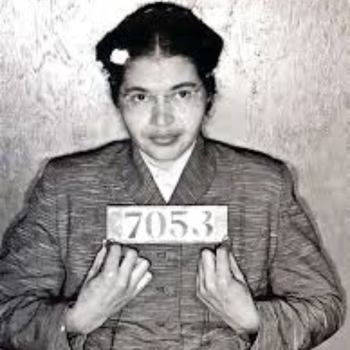The Bus
She is nationally famous for refusing to give up her seat on a segregated Alabama bus and sparking the yearlong Montgomery Bus Boycott. A seamstress returning home from a hard day’s work, the reason given was that she was tired. In the last decade, we have discovered that it was much more than that.
Rosa Parks was a trained activist and secretary of the local NAACP chapter, whose arrest was deemed the best candidate to challenge the issue in court.
Her case was the tip of the spear on the legal front, while a coordinated and disciplined bus boycott by African Americans – 75% of the riders in Montgomery – began citywide. It lasted a year.
Mrs. Parks was not the first to get arrested on a segregated bus for refusing to give up her seat to a white rider. 15-year-old Claudette Colvin’s arrest preceded Parks’ by nine months. Ms. Colvin’s juvenile arrest record was just expunged in 2021 – 66 years after she was dragged from a Montgomery bus, handcuffed, and taken to jail.
Lucille Times also had an altercation with a Montgomery bus driver and began her boycott six months before Mrs. Parks.
These women’s efforts, along with countless others led by the Women’s Political Council, were instrumental in the effectiveness of the Montgomery boycott, the country’s first large-scale anti-segregation demonstration.
The Train
In 1883, 21-year-old Ida B. Wells boarded a train traveling from Memphis to her teaching position in Shelby County, Tennessee. There were no Jim Crow laws at the time, and she was seated in the ladies’ car with a first-class ticket when the conductor came to collect fares.
When told the car was for white women only, she refused to move. Wells’ was forcibly dragged from the train, her teeth fastened in the back of the conductor’s hand, while the white passengers cheered. She later sued the railroad and won a $500 settlement. This was later overturned by the Tennessee Supreme Court, thus launching Wells into a lifetime of fiery journalism, anti-lynching and women’s voting rights campaigns.
After slavery in British Guiana, South America ended on August 1st, 1834, a system of “apprenticeship” was instituted for another four years. Freed Africans were forced to remain on the plantations and work without pay for 40 hours every week and then paid a pittance for any work they did over 40 hours.
This surplus income allowed the British government to pay the former slave owners millions for their lost human property. During that period, they invited English, German, and Scottish farmers, and later Portuguese and Indian indentured laborers to work, funded by the unpaid labor of the Africans. (After their 5-year period of servitude, the Indians were encouraged to exchange their return passage for land and a cow.)
Despite this financial inequity, in April 1840, Buxton Village was established on the East Coast of the Demerara River by 128 freed Africans who pooled their money and bought a 500-acre plantation from its owner. This was an extraordinary achievement. The founders of Buxton, and later an adjacent village named Friendship united and built roads, dug drainage, established farms, and created an administrative council to collect property taxes and maintain infrastructure.
But they faced retaliation from plantation owners who flooded their farms, and by the government that imposed unfair land taxes. Attempts by the villagers to dialogue with the governor were rebuffed.
Then news reached the villagers that the governor would be passing Buxton during a train track inspection. A plan of interception was set.
As the train approached, the women of Buxton strode onto the tracks, using their bodies as human barriers. When the train was forced to stop, the men attached chains and locks to the wheels, forcing the governor to disembark and meet with the villagers. The governor ultimately repealed the unfair tax law.
Since its inception, the people of Buxton Village have carried a reputation for courageous defiance, fierce independence, and clannishness against outsiders.
I know of this spirit firsthand. Buxton was my mother’s birth village. Family lore has it that when my father, a “Town man” from the capital, Georgetown, wanted to court my mother, my grandmother had to meet him at the edge of the village to personally vouch for him, escort him around, and make sure he left Buxton at the appointed time.
For the women who refuse to get up, and those who decide to sit down, we acknowledge the many large and small ways their actions propel the movement for equality forward.






